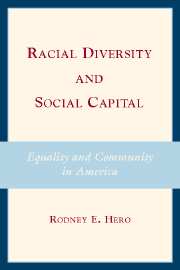Book contents
- Frontmatter
- Contents
- List of Tables and Figures
- Preface
- Acknowledgments
- 1 Introduction
- 2 The Social Capital Thesis
- 3 The Racial Diversity Thesis
- 4 Examining Social Outcomes, and Civic and Economic Equality
- 5 Voter Turnout and Other Forms of Participation in Context (with Caroline Tolbert)
- 6 Public Policy Outputs
- 7 Conclusion
- References
- Index
2 - The Social Capital Thesis
Published online by Cambridge University Press: 18 December 2009
- Frontmatter
- Contents
- List of Tables and Figures
- Preface
- Acknowledgments
- 1 Introduction
- 2 The Social Capital Thesis
- 3 The Racial Diversity Thesis
- 4 Examining Social Outcomes, and Civic and Economic Equality
- 5 Voter Turnout and Other Forms of Participation in Context (with Caroline Tolbert)
- 6 Public Policy Outputs
- 7 Conclusion
- References
- Index
Summary
The quality and durability of democracy in the United States have often been attributed in significant part to its “civil society,” sense of “community,” and, in more contemporary terminology, “social capital.” Discussed long ago by Tocqueville (1835) and echoed by other prominent scholars over the years, assertions that rich and dense networks of social interaction are and have been linchpins of U.S. democracy are strongly restated and affirmed in a number of major recent works (Putnam 2000, 1995, Skocpol et al. 2000; cf. Elazar 1966, 1972, 1984; Rice and Sumberg 1997; Knack 2002). Indeed, the social capital thesis has become a major influence and a prominent school of thought in the study of American and comparative politics, advanced by a number of scholars (Putnam 1995, 2000; Skocpol 2003; Crowley and Skocpol 2001; cf. Rice and Sumberg 1997). (Social capital theory has also been a major focus of research in other disciplines, such as sociology and economics; here, however, I will examine its impact only in political science scholarship.) Social capital and related concepts, such as “political culture” and “civic culture,” are said – and ostensibly demonstrated to be – essential correlates of procedural and substantive democracy and of civic and economic equality in America, historically and into the present.
The social capital thesis as developed by Robert Putnam (2000) concerning the role of civil society, particularly claims about social capital's significance for the society's general well-being, has received extraordinary scholarly and popular attention.
- Type
- Chapter
- Information
- Racial Diversity and Social CapitalEquality and Community in America, pp. 20 - 47Publisher: Cambridge University PressPrint publication year: 2007



